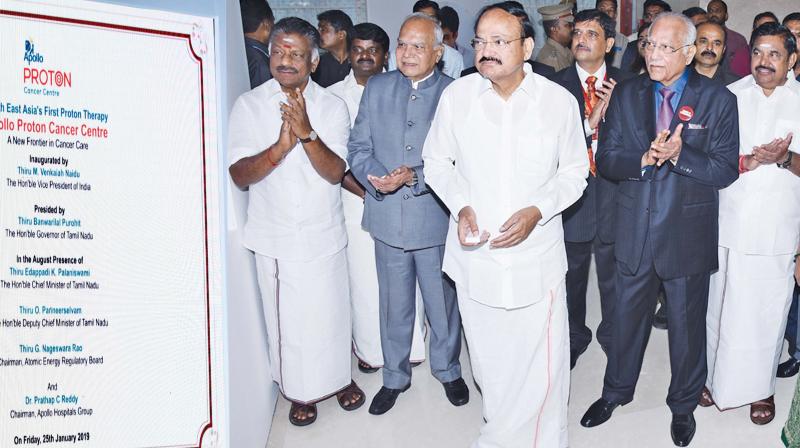M Venkaiah Naidu worried about poor infrastructure, low doctor-patient ratio
As mentioned earlier, all stakeholders in the healthcare sector must address this issue on a war footing

Chennai: Vice President M Venkaiah Naidu called upon private sector healthcare professionals to expand facilities to the rural areas, where the majority of India’s population live to eliminate the urban-rural divide in this crucial sector.
“While we have successfully eliminated some infectious diseases and improved the reach of healthcare delivery, there still is a glaring disparity in the provision of the services between urban and rural areas,” he said.
Inaugurating the Apollo Proton Cancer Center in the city on Friday, he highlighted the challenges in delivering healthcare facilities in the country despite the availability of modern methods of treatment and better healthcare.
He said that though the efforts by Union and state governments to provide healthcare facilities are being complemented by the private sector, it is mostly confined to urban areas.
“Although, these procedures are being performed at much less costs when compared to the western world, they are still out of financial reach of many people,” he said.
The Vice President expressed his concern over various obstacles in universal health coverage including inadequate public spent, low doctor-patient ratio, high share of out-of-pocket expenditure, inadequate infrastructure in rural areas, lack of penetration of health insurance and inadequate preventive mechanisms.
“As mentioned earlier, all stakeholders in the healthcare sector must address this issue on a war footing. Advanced health treatment costs have to be made affordable and within the reach of all sections,” said Vice President.
Venkaiah Naidu also addressed the rising burden of Non-Communicable Diseases (NCDs) in the country and cited World Health Organization (WHO) report for 2018 that states NCDs account for 63 per cent of deaths in India. He highlighted the need of a national campaign on the health hazards caused by modern lifestyle. He also advised Apollo Hospitals to launch mobile screening vans for both urban and rural areas to ensure wider coverage of screening programmes.

